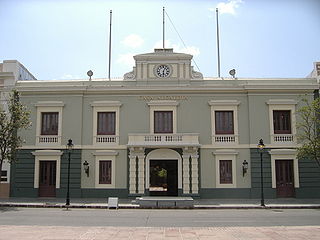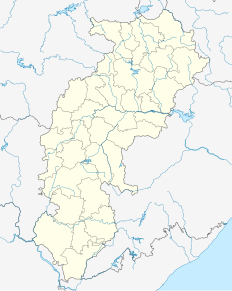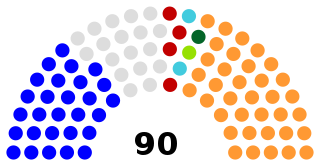
A municipality is usually a single administrative division having corporate status and powers of self-government or jurisdiction as granted by national and regional laws to which it is subordinate.

Kanpur, historically called Cawnpore, is a metropolis in the state of Uttar Pradesh in India. The greater metropolis is divided into two districts: the urban district of Kanpur Nagar and the rural district of Kanpur Dehat.
A municipal council is the legislative body of a municipality such as a city council or a town council.

Bhatapara is a city and a Nagar Palika (municipality) in the Baloda Bazar-Bhatapara district of the state of Chhattisgarh, India.
A Nagar Panchayat or Notified Area Council (NAC) in India is a settlement in transition from rural to urban and therefore a form of an urban political unit comparable to a municipality. An urban centre with more than 11,000 and less than 25,000 inhabitants is classified as a Nagar Panchayat.
Guwahati Municipal Corporation (GMC) is the local government in Guwahati, Assam, India. GMC was formed in the year 1971 by the Guwahati Municipal Corporation Act, 1969. The Corporation was duly constituted in 1974 in the first meeting of the elected councilors as per provision of Sec.45 of this Act.
Kerala has an urbanisation rate of 47.42%, as compared to the national rate of 31.16%, making it the 9th most urbanised state in India. Within Kerala, the rate of urbanisation varried from 3.9% in Wayanad district to 68.1% in Ernakulam district. Municipalities are the urban local governments that deal with civic functions and local development functions in the municipal area. The state of Kerala has 87 municipalities and six municipal corporations. With 13 municipalities, the district of Ernakulam has the most number of municipalities in the state.

Nagpur Municipal Corporation is the municipal body administering Nagpur, in Maharashtra state in Central India.
Municipal or local governance refers to the third tier of governance in India, at the level of the municipality or urban local body.
A municipal corporation is a local government in India that administers urban areas with a population of more than one million. The growing population and urbanization in various cities of India were in need of a local governing body that can work for providing necessary community services like health care, educational institution, housing, transport etc. by collecting property tax and fixed grant from the State Government.
Local government in India refers to governmental jurisdictions below the level of the state. India is a federal republic with three spheres of government: central, state and local. The 73rd and 74th constitutional amendments give recognition and protection to local governments and in addition each state has its own local government legislation. Since 1992, local government in India takes place in two very distinct forms. Urban localities, covered in the 74th amendment to the Constitution, have Nagar Palika but derive their powers from the individual state governments, while the powers of rural localities have been formalized under the panchayati raj system, under the 73rd amendment to the Constitution. For the history of traditional local government in India and South Asia, see panchayati raj.
Local bodies in Tamil Nadu constitute the three tier administration set-up in the South Indian state of Tamil Nadu. It is a system of local government which forms the last level from the Centre. Chennai Corporation in the then Madras Presidency, established in 1688, is the oldest such local body not only in India but also in any commonwealth nations outside United Kingdom.
Nagar Palika Parishad Bah is institution of Local Governance comprising three blocks Bah, Jaitpur and Pinahat. A Nagar palika or municipality is an urban local body that administers a city. Nagar Palika is Municipality of Bah, Agra, Uttar Pradesh, India. Nagar Palika is constituted as per the Constitutional provisions in the Constitution of India Act,1992.
Jabalpur Municipal Corporation is the Municipal Corporation responsible for the civic infrastructure and administration of the city of Jabalpur, located in Madhya Pradesh, India. The organization is known, in short, as JMC. This civic administrative body administers an area of 263 km2 (102 sq mi). JMC is headed by Swati Godbole, present Mayor of Jabalpur. The current collector of Jabalpur is Karmveer Sharma. Jabalpur is one of the first municipalities in India (1864). Lt. Babu Kanchedi Lal Jain of Lal Bangla was The First Nagar Palika President of Jabalpur before the freedom.
A nagar parishad or city council is a form of an urban political unit in India comparable to a municipality. An urban local body that administers with less than 100,000 and more than 20,000 inhabitants is classified as a "nagar palika" or "nagar parishad". Nagar parishad are also a form of local self-government, entrusted with some duties and responsibilities, as enshrined and guided upon by the Constitutional Act, 1992.e. g. Kondagaon is Nagar Palika in Bastar division.
The Medininagar Municipal Corporation is the municipal organisation of Medininagar, India. Medininagar Municipal Corporation or Medininagar Nagar Nigam, abbreviated MMC, is the chief nodal agency for the administration of Medininagar.

The Meerut Nagar Nigam (MNN) also known as Meerut Municipal Corporation (MMC) is the civic body that governs Meerut city. Established under the Uttar Pradesh Municipal Corporation Act-1959, it is responsible for the civic infrastructure and administration of the city.
The Aligarh Nagar Nigam (ANN) also known as Aligarh Municipal Corporation (AMC) is the civic body that governs Aligarh city. Established under the Uttar Pradesh Municipal Corporation Act-1959, it is responsible for the civic infrastructure and administration of the city. The municipal corporation covers an area of 40 km2 (15 sq mi). The first mayor of Aligarh elections were held in 1995. As of 2018, Mohammad Furqan from Bahujan Samaj Party is current mayor of Aligarh Municipal Corporation.
The 74th constitutional amendment act mandated the setting up and devolution of powers to Urban local bodies (ULBs) or city governments as the lowest unit of governance in cities and towns. This landmark initiative of the Government of India in 1993 was built upon the premise that all ‘power’ in a democracy rightfully belongs to ‘the people’. Power was mandated to be given to the people via the local bodies, namely Municipal Corporations, Councils and Nagar Panchayats, which would have representatives that are elected regularly and have a decisive role in planning, provision and delivery of services.





